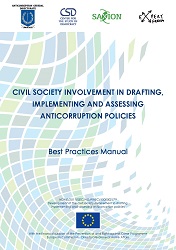Civil Society Involvement in Drafting, Implementing and Assessing Anticorruption Policies
Civil Society Involvement in Drafting, Implementing and Assessing Anticorruption Policies
Author(s): Willeke Slingerland, Johan Wempe, Michel van Hulten, Maurits Beltgens, Stefan Karaboev, Septimius Parvu
Subject(s): Politics / Political Sciences, Politics, Social Sciences, Economy, Law, Constitution, Jurisprudence, Civil Society, Sociology, Economic policy, Economic development, Socio-Economic Research
Published by: Център за изследване на демокрацията
Summary/Abstract: Cooperation between public institutions and civil society organizations (CSOs) is essential for any successful anticorruption strategy. Strengthening the role of CSOs with regard to anticorruption means thinking in terms of a system - how can a corruption system be broken and how is it possible to develop and improve national and local integrity systems (LIS). Transparency and access to information is widely seen as the key to promote greater public sector efficiency and reducing corruption because the information can be monitored by citizens and watchdog organizations. This Best Practices Manual is specifically aimed at strengthening the cooperation between civil society organizations and public institutions with regard to preventing and fighting corruption. It provides a comprehensive account of the selected best practices of cooperation, including their structure, impact, sustainability and lessons learned in countries such as Romania, Bulgaria, The Netherlands and other European Union (EU) and non-EU states. The applicability of these practices is context specific, nevertheless, it is possible to draw a number of valuable generic lessons.
- Print-ISBN-13: 978-954-477-219-2
- Page Count: 110
- Publication Year: 2014
- Language: English
- eBook-PDF
- Table of Content
- Introduction

